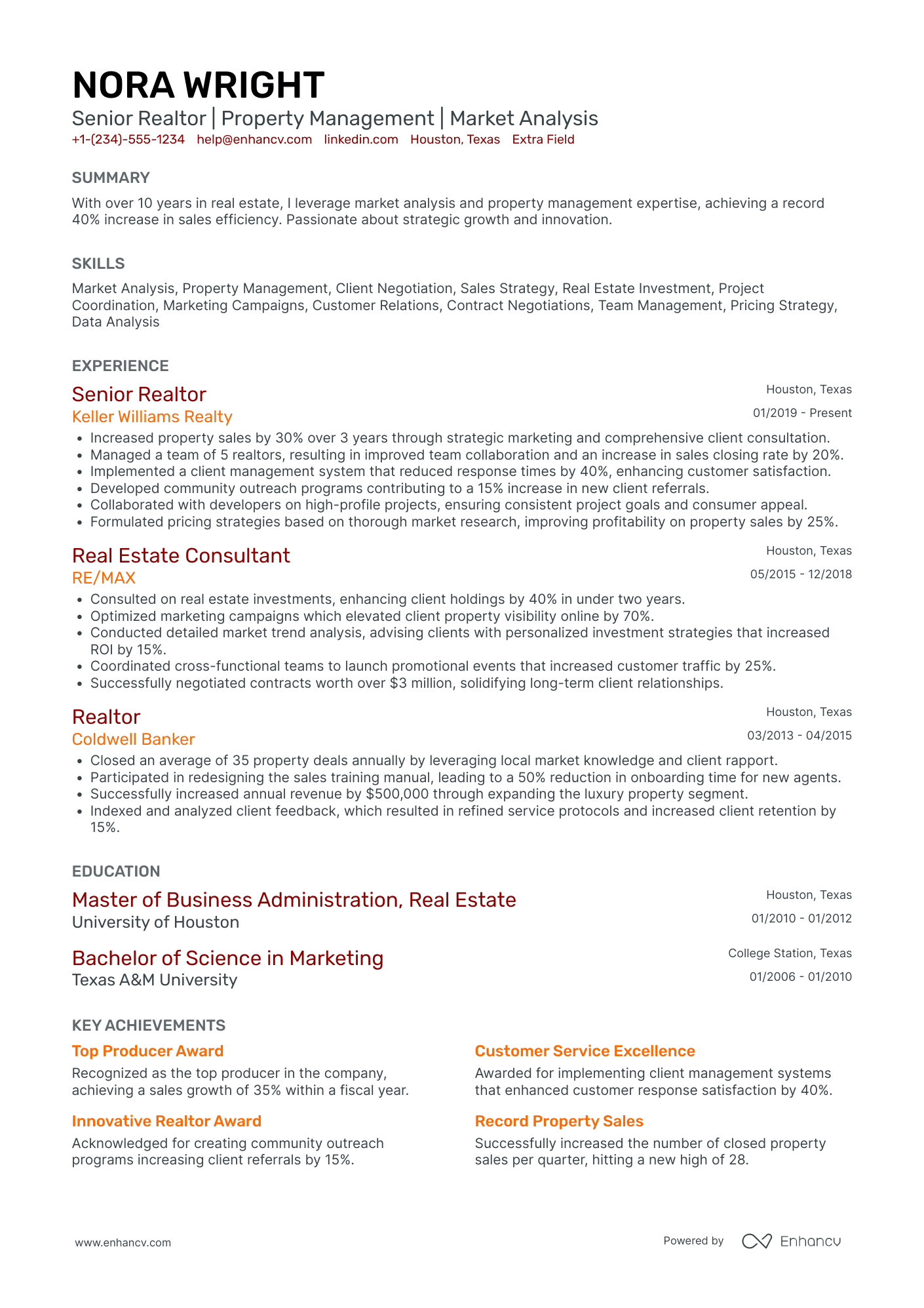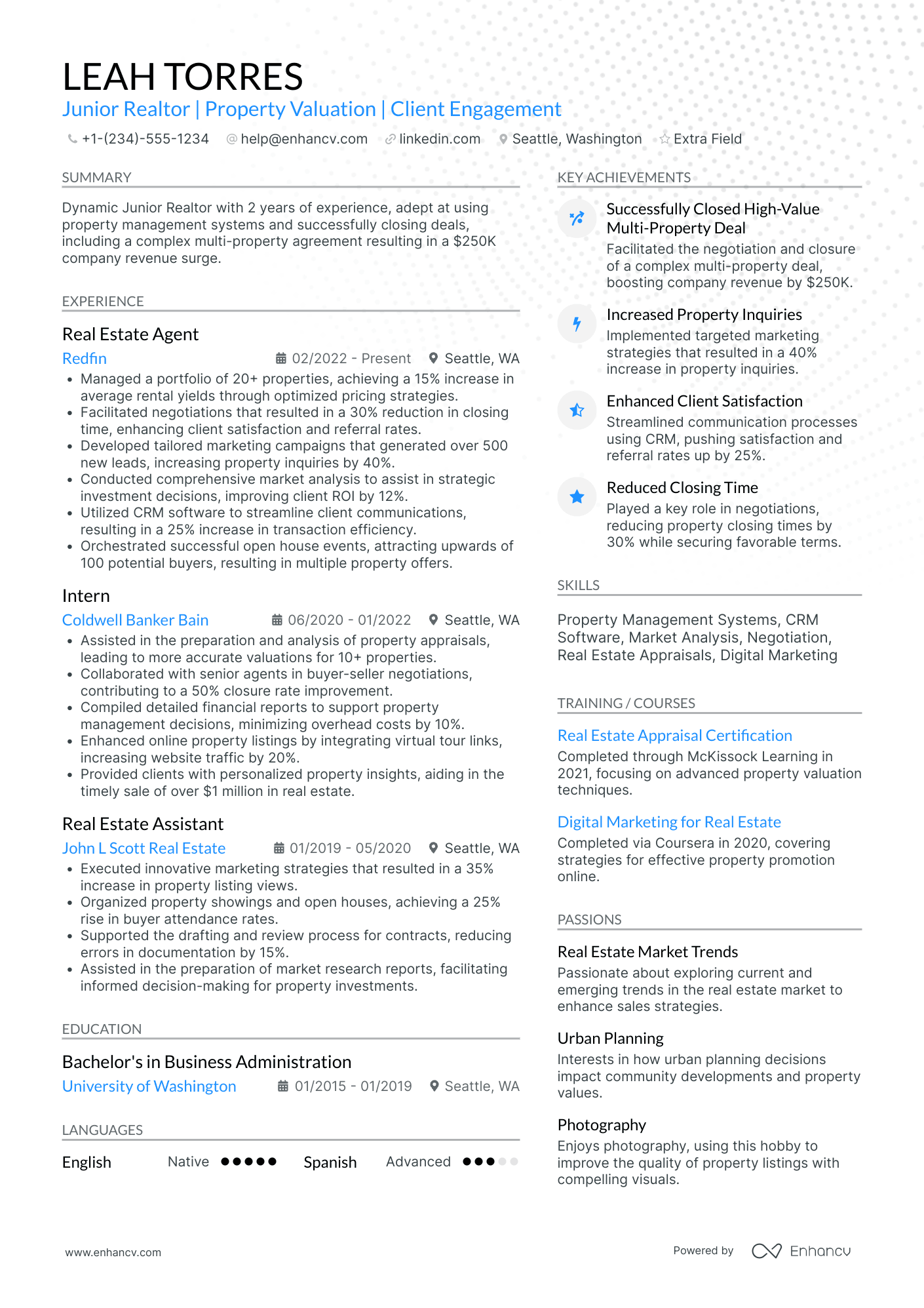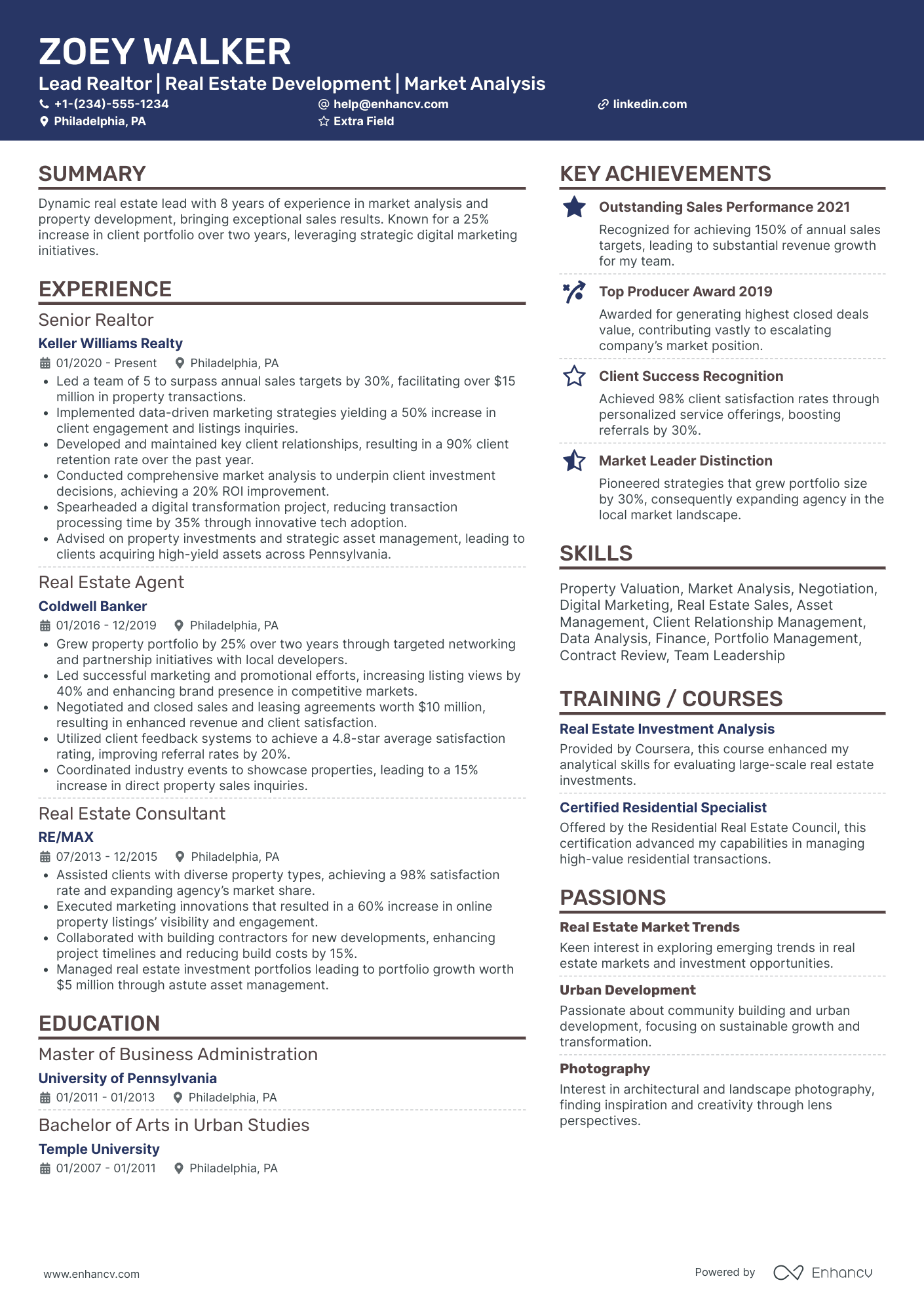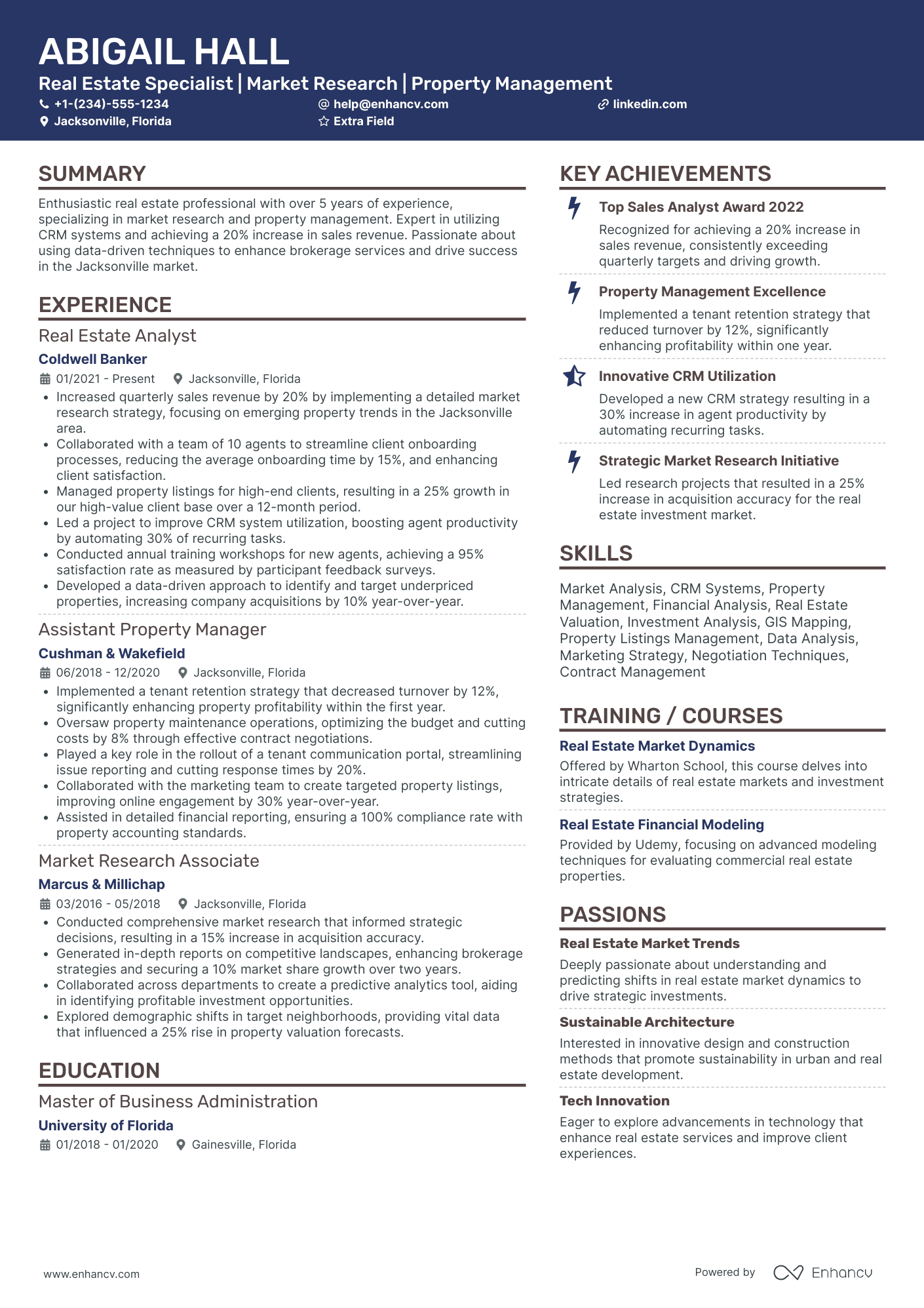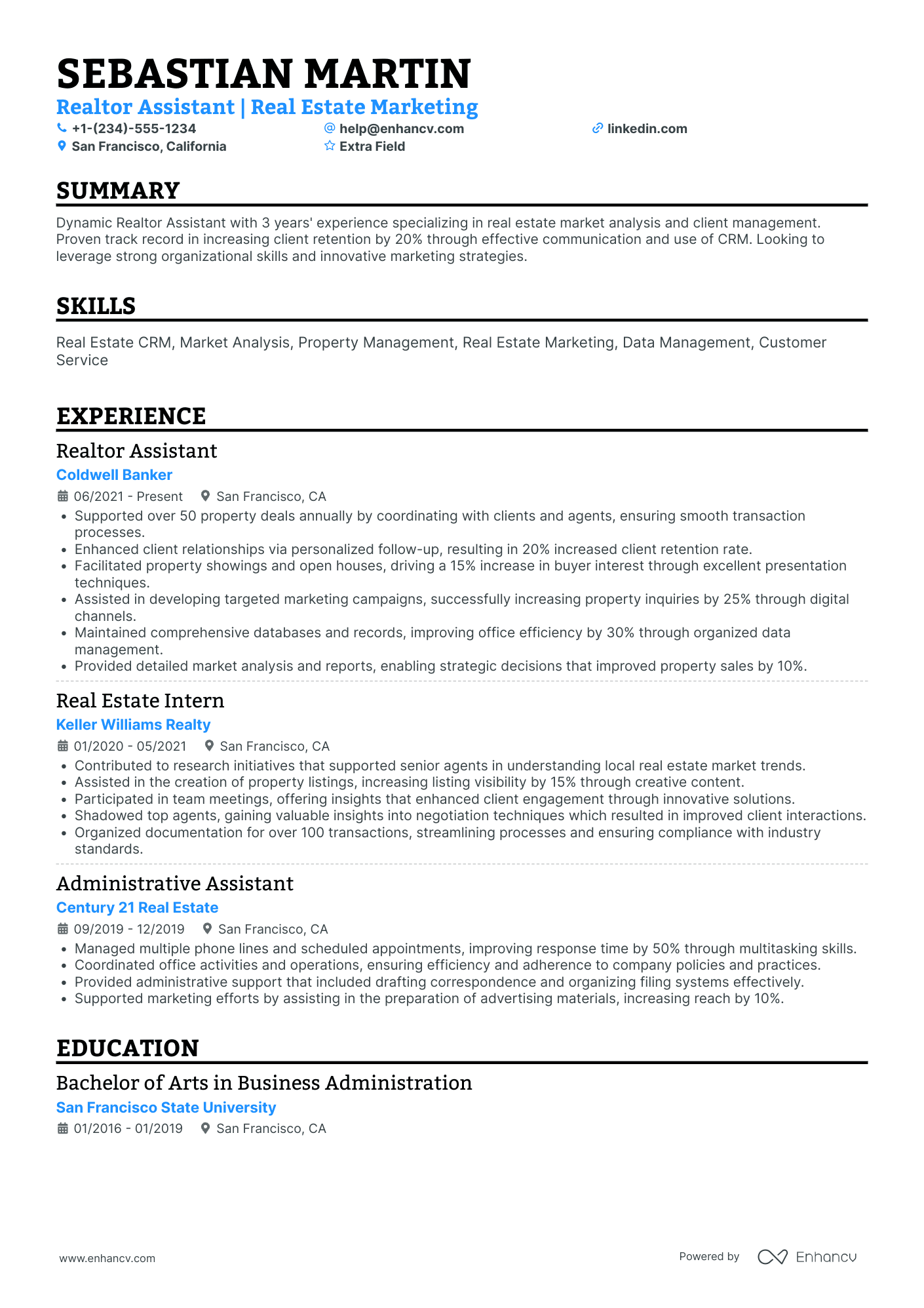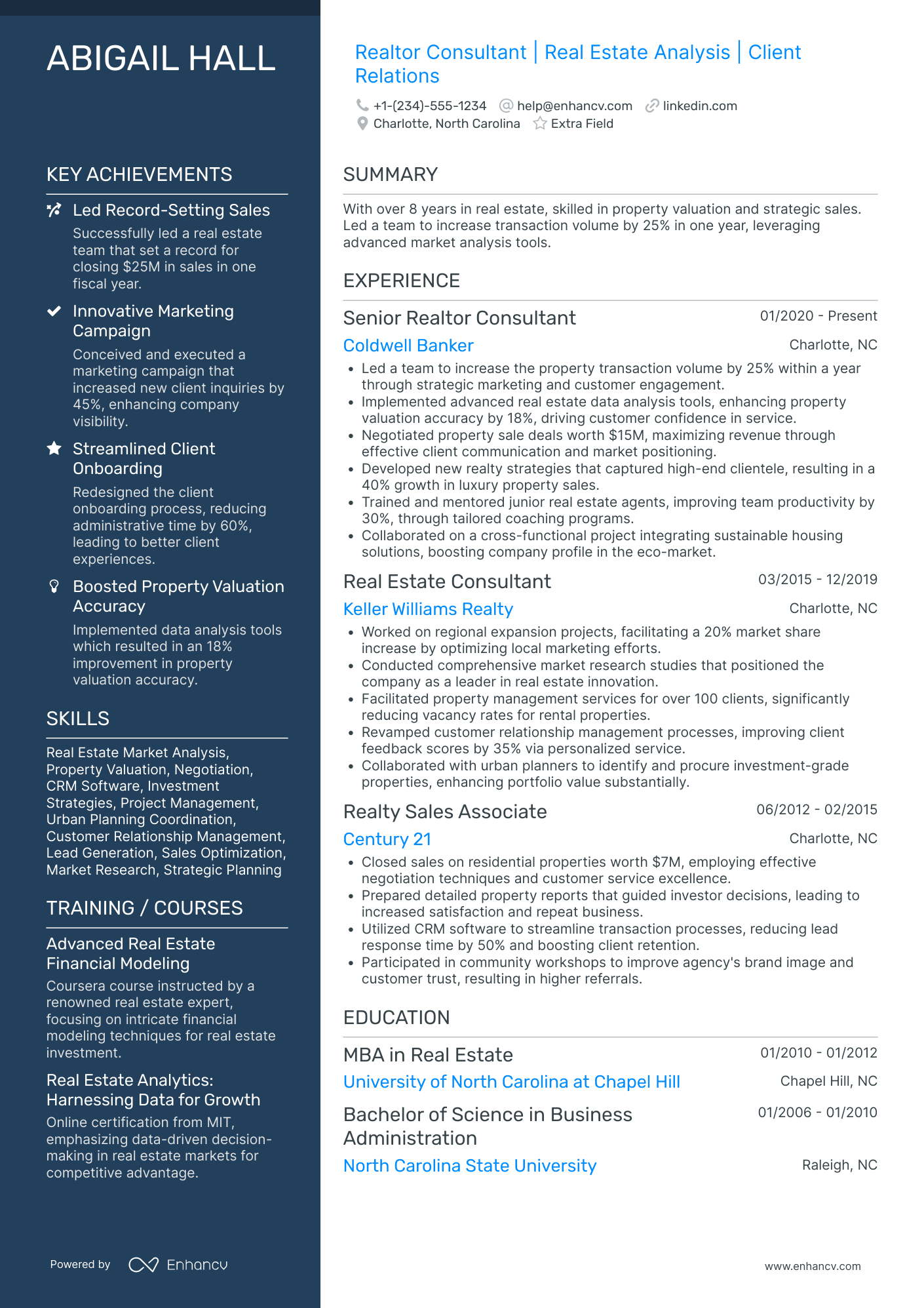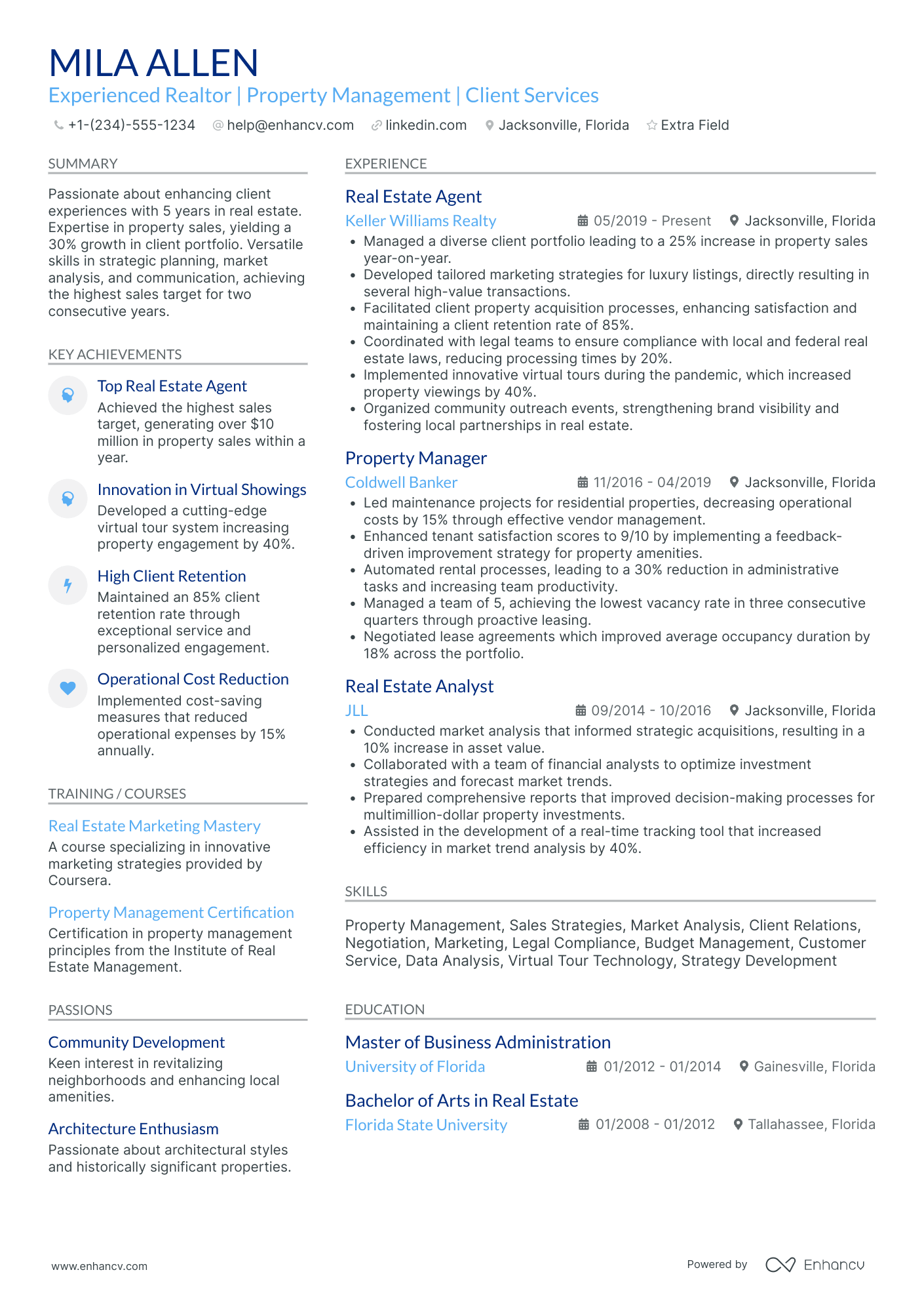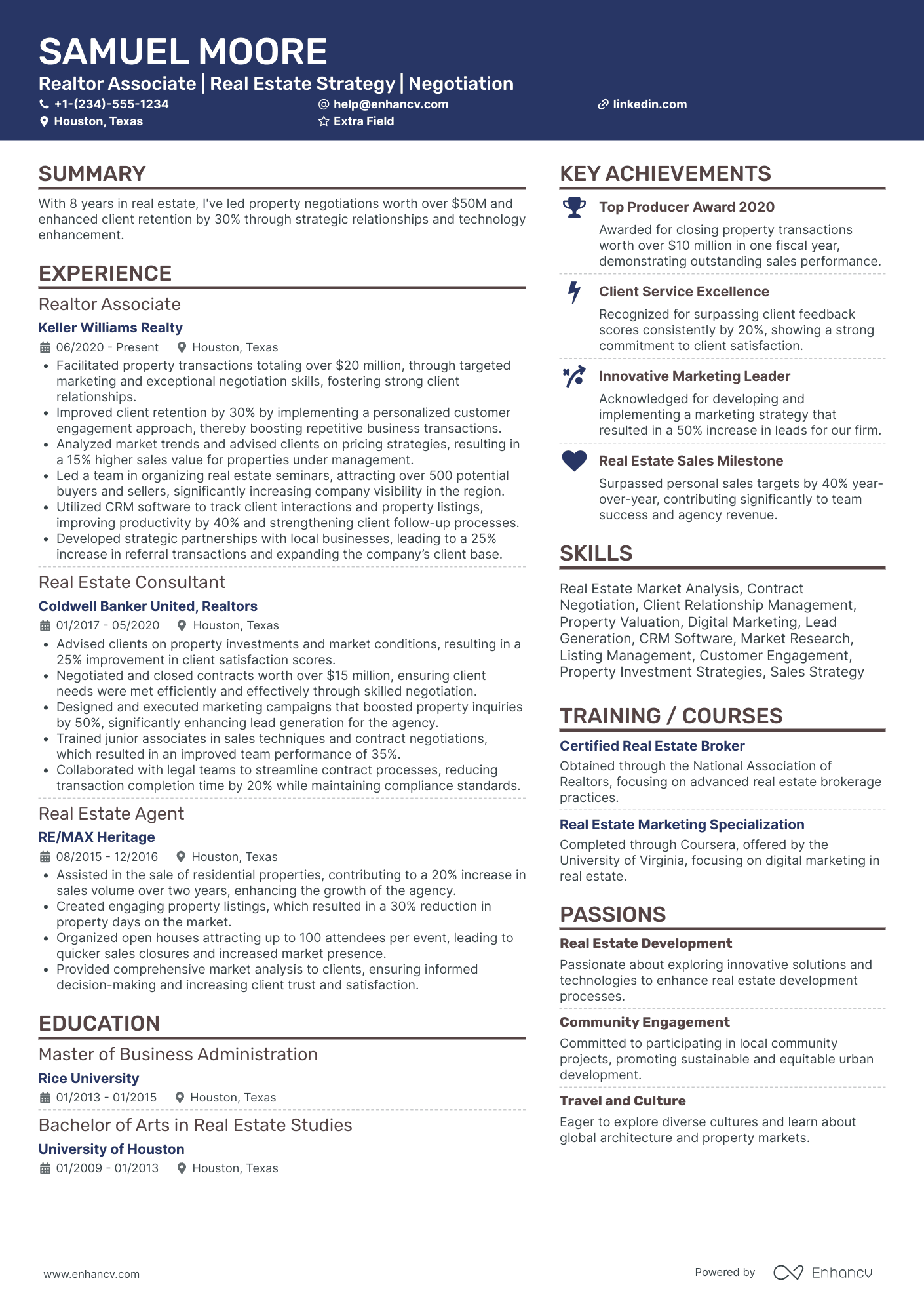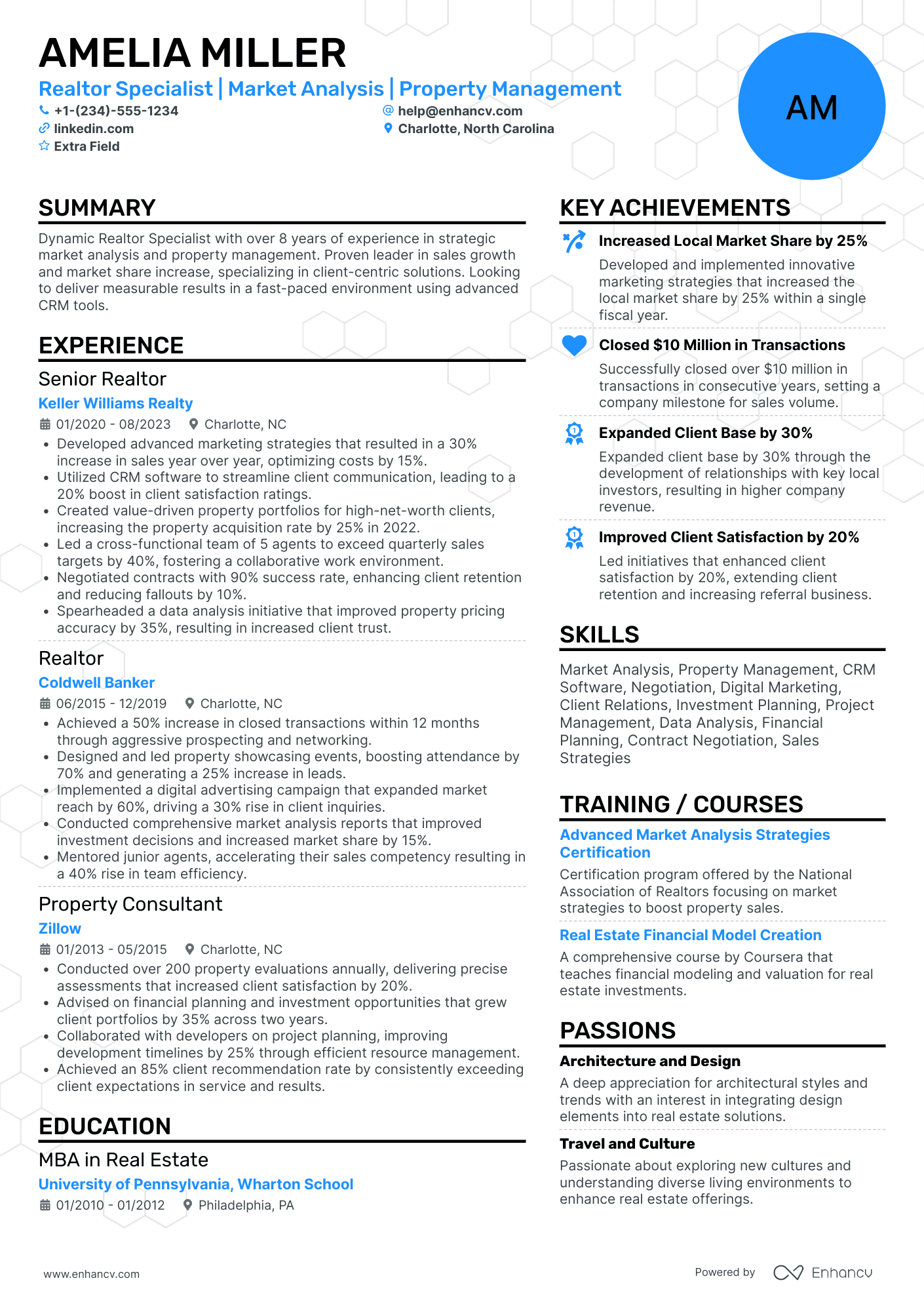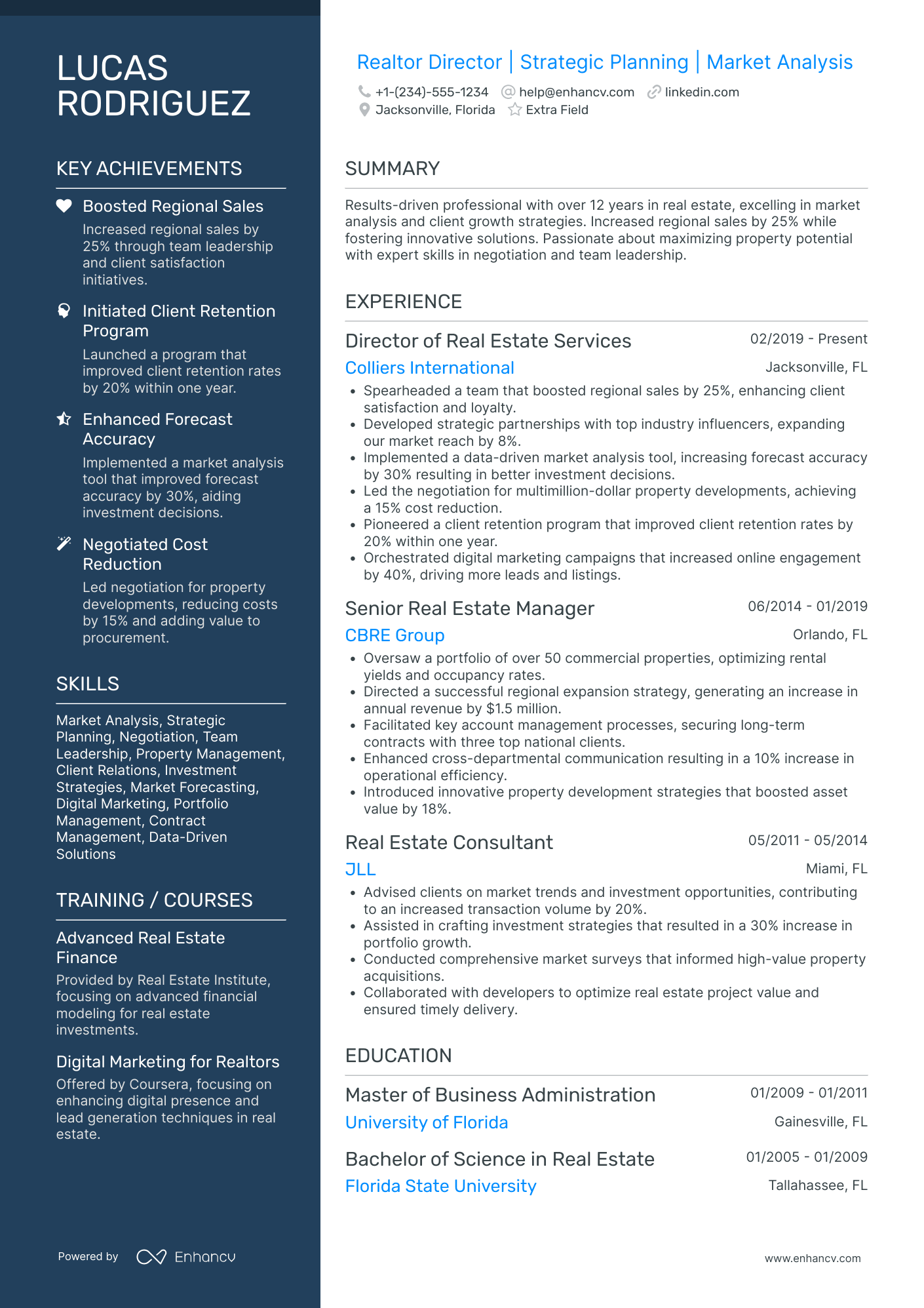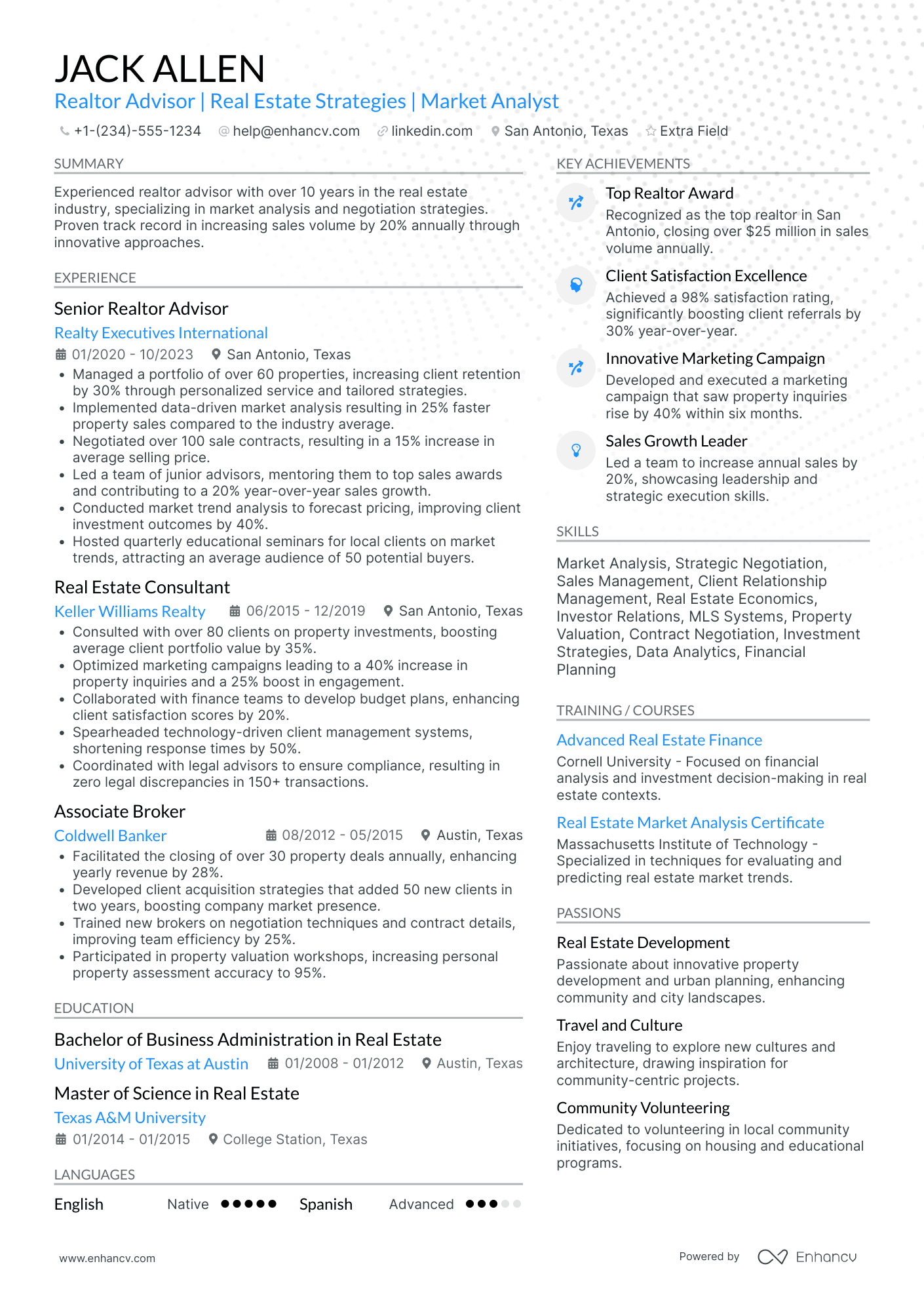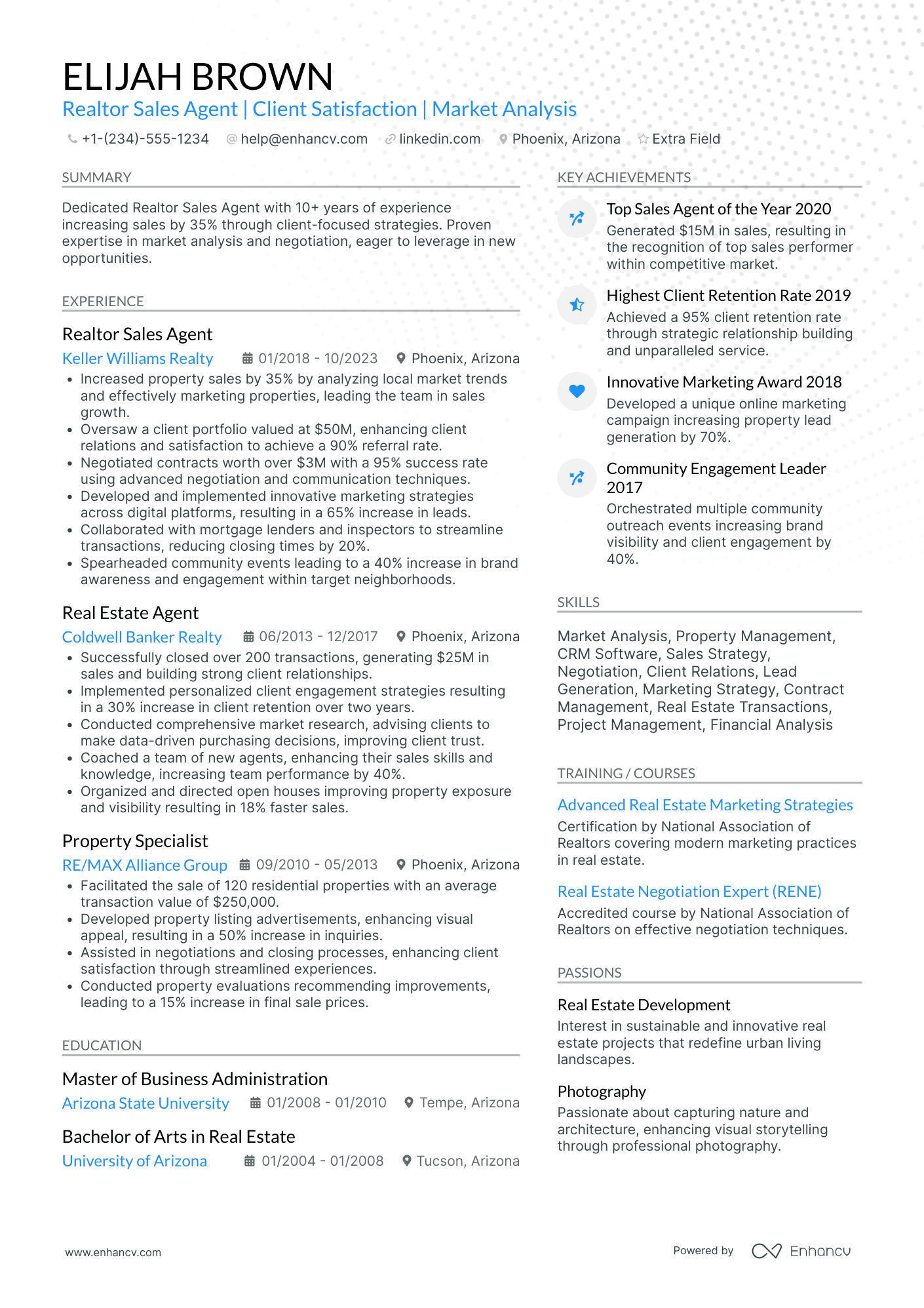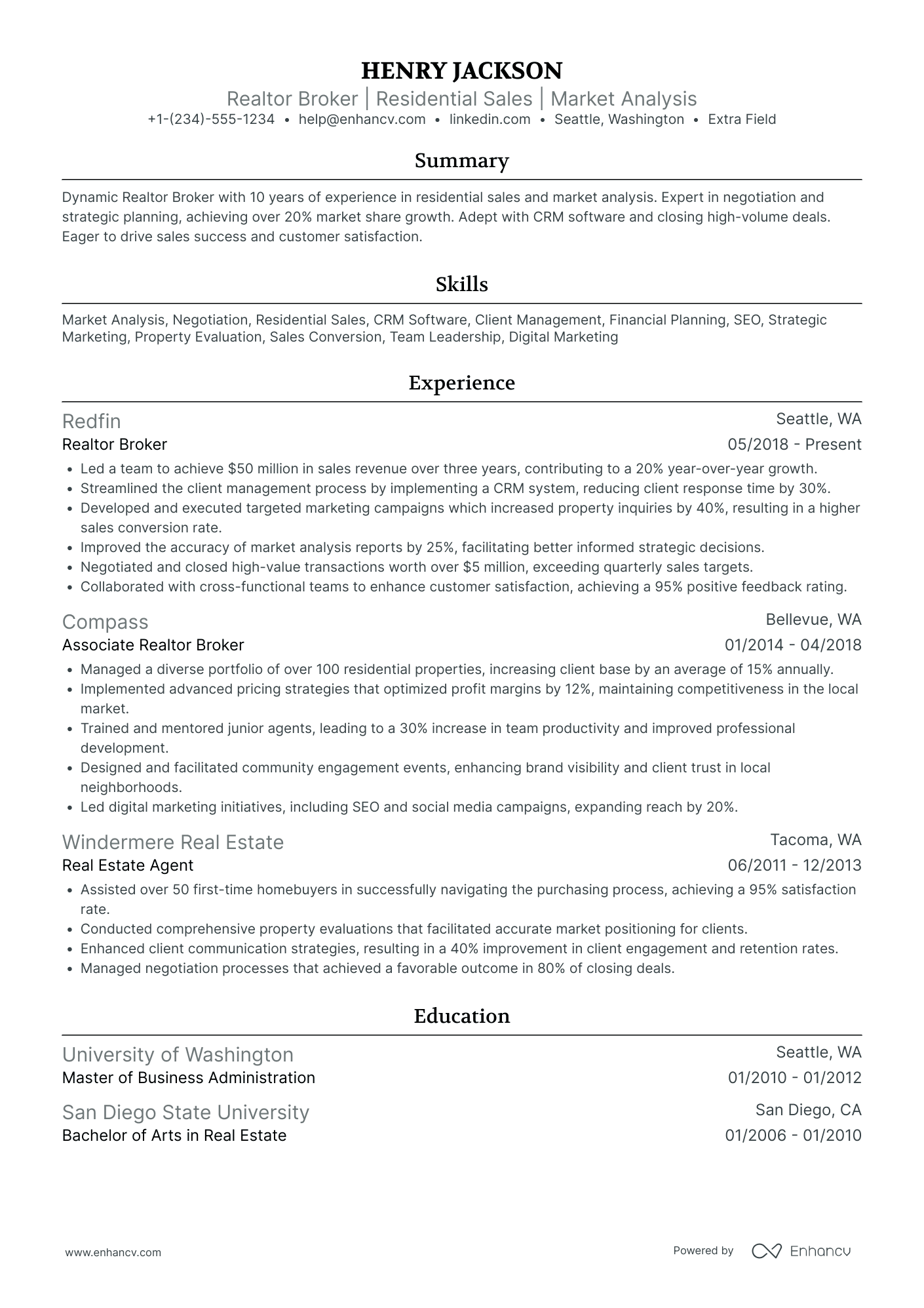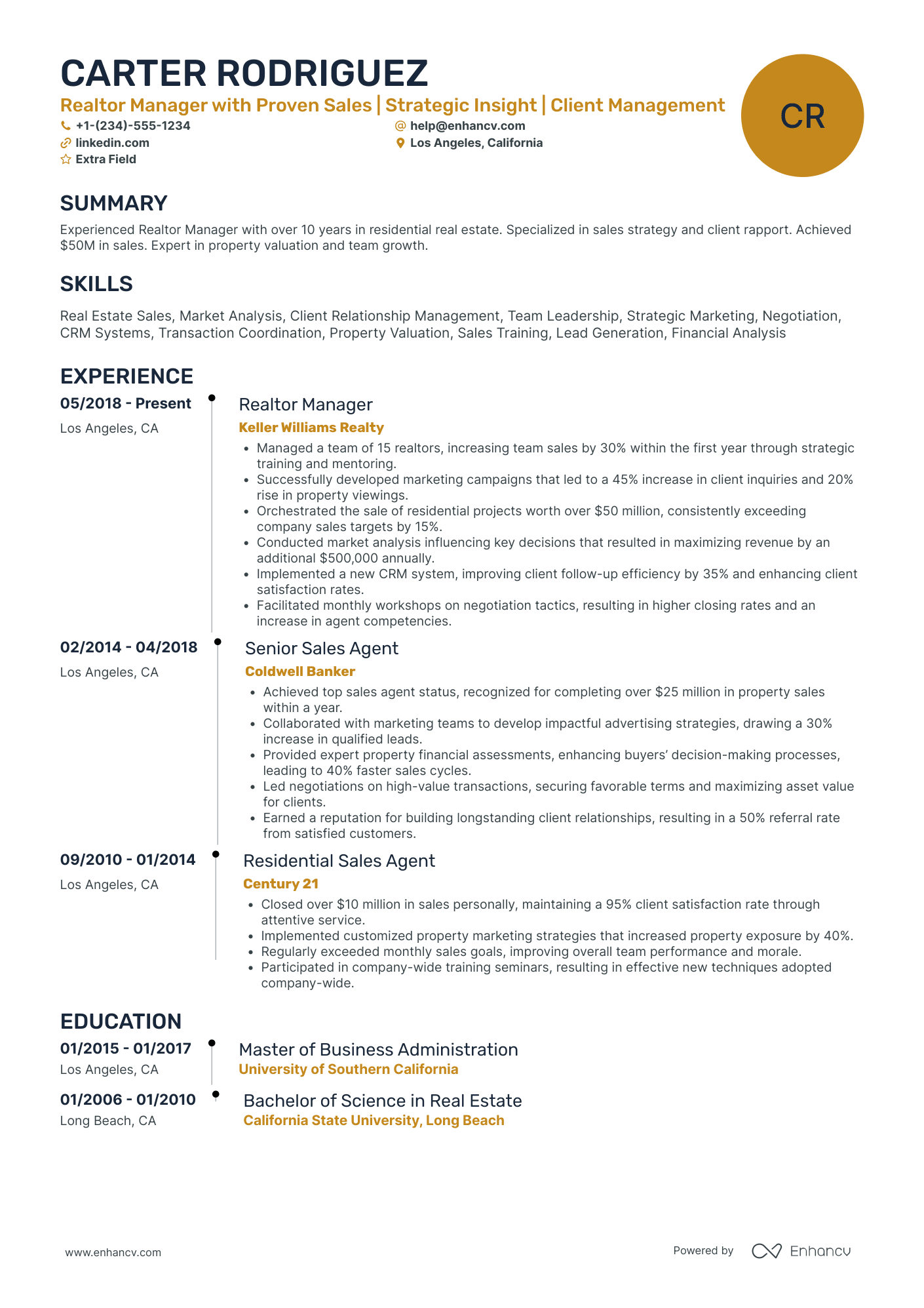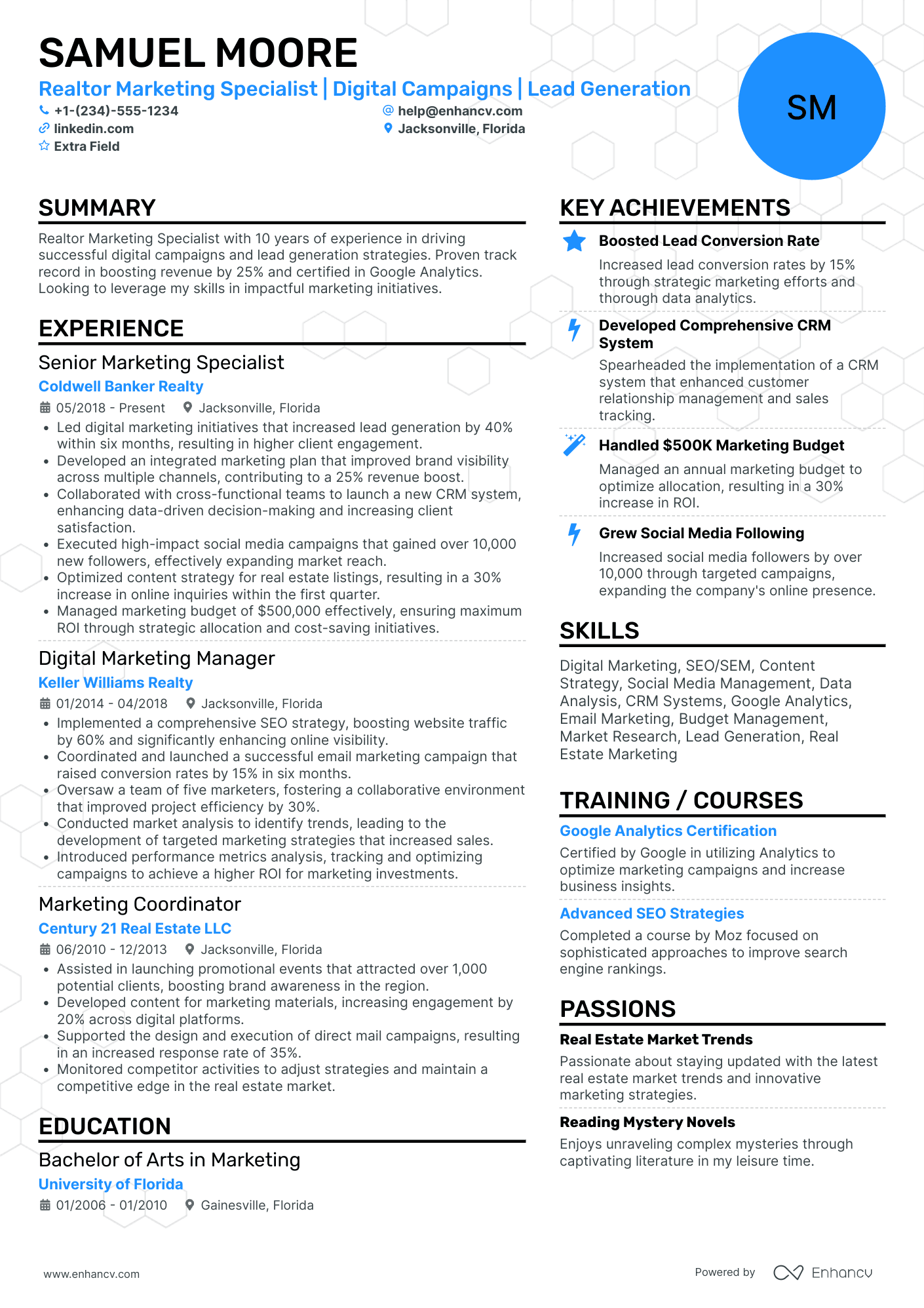Most realtor resume drafts fail because they read like job descriptions, not proof of sales impact. That matters when an ATS filters fast and recruiters scan in seconds in a crowded market. Knowing how to make your resume stand out is critical in such a competitive field.
A strong resume shows what you delivered: closed volume, win rate, average days on market, list-to-sale price ratio, and repeat-referral share. You should quantify pipeline growth, high-value deals led, negotiation outcomes, and client satisfaction results.
Key takeaways
- Quantify closed volume, conversion rates, and list-to-sale price ratio in every experience bullet.
- Use reverse-chronological format if experienced; use hybrid format when switching into real estate.
- Tailor each resume to the job posting's CRM tools, property types, and sales targets.
- Place skills above experience for junior candidates and below it for senior realtors.
- Keep your summary to four lines featuring title, market specialty, and one measurable win.
- Pair hard skills with proof in your experience bullets so claims never stand alone.
- Use Enhancv to turn vague duties into concise, metric-driven resume bullets faster.
How to format a realtor resume
Recruiters evaluating realtor candidates prioritize transaction volume, client acquisition ability, market knowledge, and consistent sales performance. A clean, well-structured resume format ensures these signals surface immediately rather than getting buried under generic skills lists or unclear timelines.
I have significant experience as a realtor—which format should I use?
Use a reverse-chronological format to lead with your strongest, most recent sales performance and client portfolio growth. Do:
- Highlight the scope of your territory, transaction volume, and client base size in each role.
- Feature role-specific competencies such as MLS platforms, CRM tools (Salesforce, Follow Up Boss), contract negotiation, and local market analysis.
- Quantify outcomes with dollar figures, units closed, and percentage growth tied to each position.
I'm junior or switching into a realtor role—what format works best?
A hybrid format works best because it lets you lead with transferable skills and relevant training while still showing a clear work timeline. Do:
- Place a skills section near the top featuring client relationship management, lead generation, market research, and any real estate licensure or coursework.
- Include projects or transitional experience such as open house coordination, property staging internships, or sales roles in adjacent industries.
- Connect every action to a result so hiring managers can see your potential impact, even without direct real estate experience.
Why not use a functional resume?
A functional resume strips away the timeline context that brokerages need to verify your licensing history, sales consistency, and market tenure—making it harder for hiring managers to trust your track record.
- A functional format may be acceptable if you're transitioning from a related field (such as mortgage lending or property management) or re-entering real estate after a career gap, but only if every listed skill is tied directly to a project, transaction, or measurable outcome.
With your format establishing a clean, scannable structure, the next step is filling it with the right sections to showcase your qualifications effectively.
What sections should go on a realtor resume
Recruiters expect your realtor resume to clearly show your transaction performance, client outcomes, and local market expertise. Understanding which resume sections to include ensures maximum clarity:
- Header
- Summary
- Experience
- Skills
- Projects
- Education
- Certifications
- Optional sections: Awards, Leadership, Languages
Strong experience bullets should emphasize closed volume, conversion rates, days on market, list-to-sale price performance, client satisfaction, and the scope of your territory and pipeline.
Is your resume good enough?
Drop your resume here or choose a file. PDF & DOCX only. Max 2MB file size.
Once you’ve organized the key resume components, you can focus on writing your realtor resume experience to show impact within that structure.
How to write your realtor resume experience
The experience section is where you prove you've closed deals, served clients, and driven measurable results in real estate. Hiring managers prioritize demonstrated impact—transactions completed, listings sold, client portfolios grown—over descriptive task lists that simply recount daily duties.
Each entry should include:
- Job title
- Company and location (or remote)
- Dates of employment (month and year)
Three to five concise bullet points showing what you owned, how you executed, and what outcomes you delivered:
- Ownership scope: the listings, client accounts, geographic markets, property portfolios, or buyer and seller pipelines you were directly accountable for managing and growing.
- Execution approach: the tools, platforms, and methods you used to price properties, generate leads, negotiate contracts, and move transactions to close—including MLS databases, CRM systems, comparative market analyses, and digital marketing strategies.
- Value improved: changes you drove in client satisfaction, listing-to-close timelines, sale-to-asking-price ratios, lead conversion rates, or overall transaction efficiency within your market.
- Collaboration context: how you coordinated with mortgage lenders, home inspectors, appraisers, title companies, attorneys, contractors, and fellow agents to ensure smooth closings and positive client experiences.
- Impact delivered: outcomes framed as business results—revenue generated, portfolio growth, market share gained, client retention achieved, or referral networks expanded—rather than activities performed.
Experience bullet formula
A realtor experience example
✅ Right example - modern, quantified, specific.
Realtor
Redwood Realty Group | Austin, TX
2021–Present
High-volume residential brokerage serving first-time buyers and move-up sellers across the Austin metro.
- Negotiated and closed $18.6M in residential transactions across forty-two deals, improving average list-to-close time by 19% through pricing strategy, offer structuring, and weekly pipeline reviews in Google Sheets.
- Built and maintained a 220+ lead pipeline in a customer relationship management system (Follow Up Boss), increasing lead-to-appointment conversion from 12% to 21% by deploying segmented email and text campaigns and standardized follow-up cadences.
- Produced pricing analyses and listing strategies using the multiple listing service (MLS), ShowingTime, and Canva marketing assets, driving a 6.4% average above-list sale price on fifteen listings while reducing price reductions by 28%.
- Coordinated inspections, appraisals, and title timelines with lenders, inspectors, and escrow, cutting contract fallout from 9% to 4% by tracking critical dates in Dotloop and resolving contingencies within forty-eight hours on average.
- Partnered with photographers, stagers, and brokerage leadership to launch listings in under five business days, improving showing volume by 23% and generating an average of three offers per listing via targeted Meta and Google Ads campaigns.
Now that you've seen how to structure your experience entries, let's focus on adjusting them to match the specific requirements of each job posting.
How to tailor your realtor resume experience
Recruiters evaluate your resume through both manual review and applicant tracking systems, so tailoring your resume to the job description is essential. Tailoring ensures the skills, tools, and achievements you highlight directly reflect what each brokerage or agency prioritizes.
Ways to tailor your realtor experience:
- Mirror the CRM or MLS platforms named in the job description.
- Match listing marketing methods the brokerage specifically references.
- Use the same terminology for transaction coordination or closing processes.
- Reflect the sales volume or deal metrics the posting emphasizes.
- Highlight experience in the property types or markets they serve.
- Emphasize client relationship strategies aligned with their service model.
- Include relevant fair housing or real estate compliance knowledge requested.
- Reference team collaboration or mentorship structures the role describes.
Tailoring means connecting your real accomplishments to what the role requires, not forcing unrelated keywords into your experience section.
Resume tailoring examples for realtor
| Job description excerpt | Untailored | Tailored |
|---|---|---|
| "Manage residential listings using MLS, conduct open houses, and guide clients through closing processes in a fast-paced brokerage environment." | Helped clients buy and sell homes in the local area. | Managed 45+ active residential listings on MLS, hosted weekly open houses that generated an average of 12 qualified leads per event, and guided 30 clients annually through closing—from offer negotiation to final walkthrough. |
| "Develop new business through cold outreach, referral networks, and community engagement to meet a quarterly sales volume target of $5M." | Worked on growing the client base and increasing sales. | Built a referral network of 80+ past clients and local mortgage brokers, conducted 50+ cold outreach calls weekly, and consistently exceeded the $5M quarterly sales volume target by 15% through targeted community sponsorships and neighborhood farming campaigns. |
| "Use CRM software to track buyer and seller pipelines, coordinate with title companies and inspectors, and ensure compliance with state real estate disclosure requirements." | Kept track of client information and coordinated with other parties during transactions. | Tracked 60+ concurrent buyer and seller pipelines in Salesforce CRM, coordinated inspections and title searches with third-party vendors to keep transactions on schedule, and ensured 100% compliance with state-mandated property disclosure requirements across all listings. |
Once you’ve aligned your experience with the role’s priorities, quantify your realtor achievements to show the measurable impact behind those responsibilities.
How to quantify your realtor achievements
Numbers on your resume show the business impact behind your deals and client service. Focus on closed volume, days on market, list-to-sale price ratio, lead-to-close conversion, and compliance accuracy.
Quantifying examples for realtor
| Metric | Example |
|---|---|
| Revenue closed | "Closed $12.4M in residential sales across twenty-eight transactions in 2024, generating $310K in gross commission income in a competitive market." |
| Cycle time | "Reduced average days on market from forty-two to twenty-seven by tightening pricing strategy and launching MLS listings within twenty-four hours." |
| Conversion rate | "Improved lead-to-appointment conversion from 18% to 29% using Follow Up Boss automations and two-call, two-text outreach within one hour." |
| Pricing accuracy | "Achieved a 101.6% list-to-sale price ratio across fifteen listings by using comparative market analysis comps and weekly price-position reviews." |
| Compliance risk | "Maintained zero contract-to-close compliance issues across sixty files by standardizing disclosures, e-sign workflows in DocuSign, and audit checklists." |
Turn vague job duties into measurable, recruiter-ready resume bullets in seconds with Enhancv's Bullet Point Generator.
Once you've crafted strong bullet points to showcase your experience, the next step is ensuring your resume also highlights the right hard and soft skills that set you apart as a realtor.
How to list your hard and soft skills on a realtor resume
Your skills section shows how you win listings and close transactions, and recruiters and an ATS (applicant tracking system) scan this section to match you to the job post—aim for a hard-skills-heavy mix supported by role-specific soft skills. realtor roles require a blend of:
- Product strategy and discovery skills.
- Data, analytics, and experimentation skills.
- Delivery, execution, and go-to-market discipline.
- Soft skills.
Your skills section should be:
- Scannable (bullet-style grouping).
- Relevant to the job post.
- Backed by proof in experience bullets.
- Updated with current tools.
Place your skills section:
- Above experience if you're junior or switching careers.
- Below experience if you're mid/senior with strong achievements.
Hard skills
- Multiple listing service (MLS)
- Comparative market analysis (CMA)
- Listing presentation development
- Pricing strategy and comps
- Customer relationship management, follow-up automation
- Real estate contract drafting
- Transaction coordination workflows
- Showing scheduling platforms
- Digital marketing, paid ads
- Listing photography, virtual tours
- Fair Housing compliance
- Lead generation funnels
Soft skills
- Run structured buyer consultations
- Set expectations and boundaries
- Negotiate inspection and repair terms
- Communicate clearly under time pressure
- De-escalate conflict between parties
- Influence sellers with data-backed advice
- Qualify leads and disqualify fast
- Coordinate lenders, inspectors, attorneys
- Manage multiple deals simultaneously
- Follow up consistently and on schedule
- Document decisions and next steps
- Take ownership through closing
How to show your realtor skills in context
Skills shouldn't live only in a dedicated skills list. Browse resume skills examples to see how top candidates weave competencies throughout their application.
They should be demonstrated in:
- Your summary (high-level professional identity)
- Your experience (proof through outcomes)
Here's what that looks like in practice.
Summary example
Senior residential realtor with 12 years closing luxury properties across South Florida. Skilled in MLS analytics, CRM pipeline management, and consultative selling—averaging $9.2M in annual sales volume while maintaining a 94% client satisfaction rate.
- Reflects senior-level expertise immediately
- Names specific tools and methods
- Leads with a measurable sales metric
- Highlights client relationship soft skills
Experience example
Senior Real Estate Agent
Compass Realty Group | Miami, FL
March 2019–Present
- Closed $47M in residential transactions over four years using MLS data analysis and targeted pricing strategies, exceeding team benchmarks by 18%.
- Collaborated with mortgage brokers, home inspectors, and attorneys to streamline closings, reducing average transaction timelines by 11 days.
- Managed a pipeline of 60+ active leads through Salesforce CRM, converting 34% into signed listings via personalized follow-up campaigns.
- Every bullet includes measurable proof
- Skills surface naturally through real outcomes
Once you’ve grounded your abilities in real examples, the next step is to structure a resume that highlights those strengths even if you don’t have direct real estate experience.
How do I write a realtor resume with no experience
Even without full-time experience, you can demonstrate readiness through:
- Real estate coursework and certifications
- Open house volunteer support
- Property research and comp analysis
- Customer-facing sales or retail work
- CRM pipeline projects and tracking
- Marketing content for listings
- Local market reports and data analysis
- Transaction paperwork practice simulations
If you're building a resume without work experience, focus on:
- Quantified results from sales roles
- Clear CRM and pipeline experience
- Market research and comp analysis
- Marketing samples tied to outcomes
Resume format tip for entry-level realtor
Use a hybrid resume format. It highlights relevant projects and skills first, while still showing steady work history and education. Do:
- Add a "Relevant Projects" section first.
- Quantify outcomes using counts and rates.
- List realtor tools you used.
- Mirror keywords from the job post.
- Keep bullets to one line.
- Built a CRM pipeline in HubSpot with fifty leads, tracked follow-ups for four weeks, and improved response rate from ten percent to twenty-two percent.
Even without direct real estate experience, your education section can demonstrate the foundational knowledge and credentials that qualify you for the role.
How to list your education on a realtor resume
Your education section helps hiring teams confirm you have foundational knowledge in real estate, business, or finance. It validates your qualifications quickly and builds credibility.
Include:
- Degree name
- Institution
- Location
- Graduation year
- Relevant coursework (for juniors or entry-level candidates)
- Honors & GPA (if 3.5 or higher)
Avoid listing specific months or days. Use the graduation year only for a cleaner look.
Here's a strong education entry tailored for a realtor resume.
Example education entry
Bachelor of Science in Real Estate and Urban Economics
University of Southern California, Los Angeles, CA
Graduated 2021
GPA: 3.7/4.0
- Relevant Coursework: Real Estate Finance, Property Valuation, Urban Land Development, Contract Law
- Honors: Dean's List, Magna Cum Laude
How to list your certifications on a realtor resume
Certifications on your resume show a realtor's commitment to learning, proficiency with modern tools, and alignment with current industry standards, which helps employers trust your expertise faster.
Include:
- Certificate name
- Issuing organization
- Year
- Optional: credential ID or URL
- Place certifications below education when your degree is recent and your certifications add support rather than define your specialization.
- Place certifications above education when they are recent, highly relevant to the role, or more impressive than older education credentials.
Best certifications for your realtor resume
- REALTOR® (National Association of REALTORS®)
- Licensed Real Estate Salesperson or Broker (State Real Estate Commission)
- Accredited Buyer's Representative (ABR®)
- Seller Representative Specialist (SRS)
- Certified Residential Specialist (CRS)
- Pricing Strategy Advisor (PSA)
- Certified International Property Specialist (CIPS)
Once you’ve positioned your credentials where hiring managers can spot them quickly, you can write your realtor resume summary to reinforce that expertise upfront.
How to write your realtor resume summary
Your resume summary is the first thing a recruiter reads, so it must immediately signal your value. A strong opening positions you as a qualified realtor who delivers real results.
Keep it to three to four lines, with:
- Your title and total years of experience in real estate.
- The market type or property segment you specialize in.
- Core skills like contract negotiation, MLS platforms, or CRM tools.
- One or two measurable wins, such as sales volume or closing rates.
- Soft skills tied to outcomes, like client rapport that drives repeat business.
PRO TIP
At the mid-level realtor stage, emphasize consistent sales performance and client relationship skills. Highlight specific transaction volumes or portfolio growth rather than generic phrases like "passionate about real estate" or "motivated self-starter." Recruiters want proof of results, not enthusiasm statements.
Example summary for a realtor
Licensed realtor with four years of residential sales experience. Closed $8.2M in transactions last year across 34 deals. Skilled in CRM management, contract negotiation, and building referral networks that generate 40% repeat business.
Optimize your resume summary and objective for ATS
Drop your resume here or choose a file.
PDF & DOCX only. Max 2MB file size.
What to include in a realtor resume header
A resume header lists your key identity and contact details, helping recruiters spot you fast, trust your professionalism, and screen you efficiently.
Essential resume header elements
- Full name
- Tailored job title and headline
- Location
- Phone number
- Professional email
- GitHub link
- Portfolio link
A LinkedIn link helps recruiters confirm your work history quickly and supports faster screening.
Don't include a photo unless the role is explicitly front-facing or appearance-dependent.
Match your header title to the listing and add your service area to your location to align with how recruiters filter realtor candidates.
Example
Realtor resume header
Jordan Taylor
Realtor | Residential Sales | Buyer and Seller Representation
Austin, TX
(512) 555-12XX
jordan.taylor@enhancv.com
github.com/jordantaylor
jordantaylorhomes.com
linkedin.com/in/jordantaylor
Once your contact details and key credentials are easy to spot at the top, you can strengthen the rest of your application with additional sections that add relevant context and proof.
Additional sections for realtor resumes
Extra resume sections help you stand out when your core qualifications match other candidates, giving you a chance to showcase unique strengths. For example, listing language skills on your resume can be a major differentiator when serving multilingual clients in diverse markets.
- Languages
- Certifications and licenses
- Professional affiliations
- Volunteer experience
- Awards and achievements
- Publications
- Hobbies and interests
Once you've rounded out your resume with the right supplementary sections, it's worth pairing it with a cover letter to strengthen your overall application.
Do realtor resumes need a cover letter
A cover letter isn't required for most realtor roles, but it helps in competitive markets or brokerages with strict hiring expectations. If you're unsure what a cover letter is and how it supports your application, it's worth learning before you decide to skip one. It can make a difference when your resume needs context or when you want to show clear fit.
Use a cover letter when it adds specific, useful detail:
- Explain why you fit the realtor role and the team: connect your style, market focus, and client approach to how the brokerage operates.
- Highlight one or two outcomes: mention closed volume, lead conversion gains, referral growth, or a marketing campaign that produced qualified showings.
- Show you understand the business context: reference the brokerage's market, typical buyers and sellers, listing strategy, and how you support clients through the process.
- Address transitions or non-obvious experience: link past sales, hospitality, or finance work to client management, negotiation, and pipeline discipline.
Drop your resume here or choose a file.
PDF & DOCX only. Max 2MB file size.
If you decide to skip a cover letter and rely on your resume to carry the application, using AI to improve your realtor resume helps you sharpen the content and presentation efficiently.
Using AI to improve your realtor resume
AI can sharpen your resume's clarity, structure, and overall impact. It helps tighten language and highlight achievements that matter to brokers. But overuse strips away authenticity. Once your content feels clear and aligned with your actual role, step away from AI. If you're curious about which AI is best for writing resumes, start with tools that help you refine rather than generate from scratch.
Here are 10 practical prompts you can copy and paste to strengthen specific sections of your realtor resume:
- Strengthen your summary. "Rewrite my realtor resume summary to highlight my market expertise, client results, and years of experience in under four sentences."
- Quantify sales results. "Add specific metrics like volume sold, units closed, or percentage over asking price to these realtor experience bullets."
- Tighten bullet points. "Shorten each of my realtor experience bullets to one line, starting with a strong action verb."
- Align skills with listings. "Compare my realtor skills section against this job posting and suggest missing keywords I should add."
- Improve certification descriptions. "Rewrite my realtor certifications section so each entry clearly states the credential's relevance to residential sales."
- Refine education details. "Edit my realtor education section to emphasize real estate coursework, licensing, and any honors earned."
- Clarify project contributions. "Rewrite my realtor project descriptions to specify my role, the property type, and the measurable outcome."
- Remove filler language. "Identify and remove vague or redundant phrases from my realtor resume without changing the original meaning."
- Tailor for brokerage fit. "Adjust my realtor resume summary and experience bullets to match the tone and priorities of this brokerage job description."
- Boost action verbs. "Replace weak or repeated verbs across my realtor experience section with varied, high-impact alternatives."
Stop using AI once your resume sounds accurate, specific, and aligned with real experience. AI should never invent experience or inflate claims—if it didn't happen, it doesn't belong here.
Conclusion
A strong realtor resume highlights measurable outcomes, role-specific skills, and a clear structure. Use numbers to show closed deals, revenue, lead conversion, and listing performance. Match your skills to the role, and keep each section easy to scan.
This approach shows you’re ready for today’s hiring market and what’s next. A focused, results-led realtor resume helps hiring teams assess your impact fast. Keep it direct, accurate, and consistent, and you’ll stand out for the right reasons.
